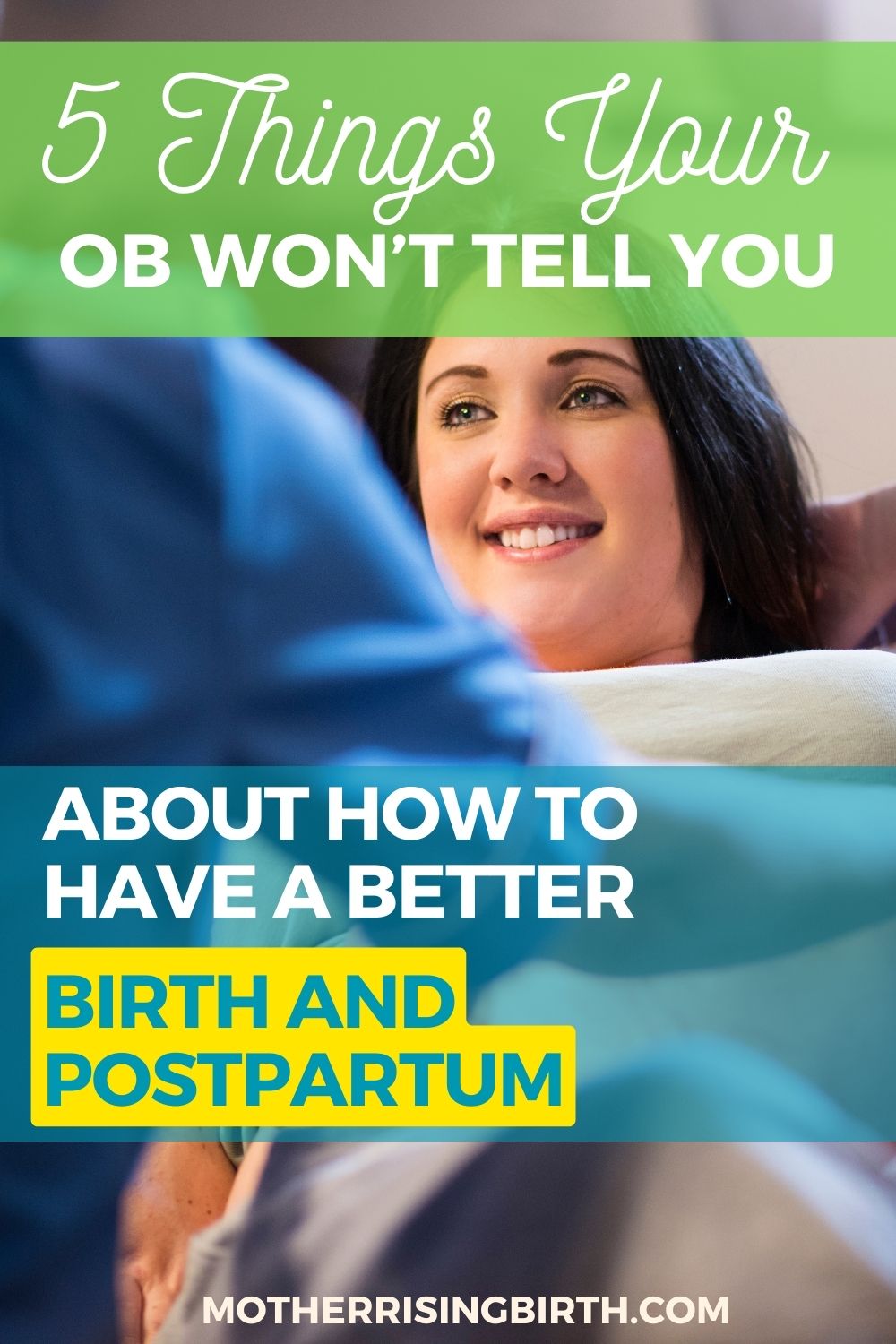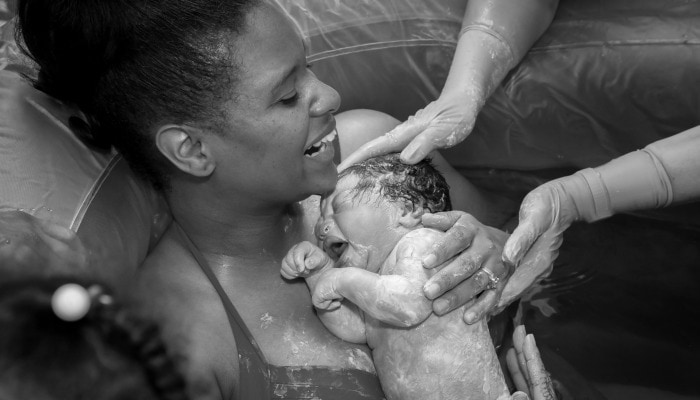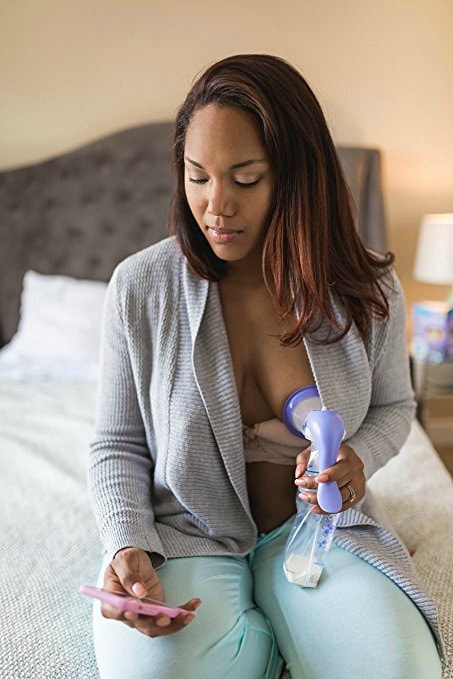Over the years I’ve realized there are things your OBGYN won’t tell you about how to have a better birth and postpartum – 5 things in particular.
For my first pregnancy I used an out of hospital midwife and had my baby at a birth center. Because my pregnancies became a tiny bit higher risk after that, my prenatal care switched to an OB but then eventually ended with a midwife again. I’m also a doula and childbirth educator and what that means is… I just know too much. I know too much about what prenatal and postpartum care could be. 😉
With an OB my prenatal visits were short and rushed. Honestly, I spent more time waiting for the appointment than in my actual appointment. Even though the staff was very friendly and helpful, I felt like just a number. My experience left much to be desired.
Here are the 5 things I found that your OBGYN won’t tell you about how to have a better birth and postpartum. PLEASE use this information so that you can have a strong birth and healthy postpartum!

1. Stay Healthy and Low Risk
One of the most powerful things a woman can do to help have a better birth and postpartum is to be healthy and stay low risk throughout her pregnancy. Some complications are out of our control, but some are not.
Gestational diabetes, preeclampsia, and intrauterine growth restriction (IUGR), for example, are three common pregnancy complications that can turn a healthy pregnancy into a more complicated fiasco, all increasing the chance of cesarean, induction, and sick babies (which obviously make for a more difficult birth and postpartum).
Did you know that these three pregnancy complications do not necessarily happen by chance? There are simple things you can do to decrease your risk.
For example, by eating probiotic rich food or taking a probiotic daily, you can reduce the chance of ALL the pregnancy complications listed above. I think that’s pretty cool! (PLEASE click through the link above, read it, and check my sources before commenting below.)
I’m not saying that everyone can magically have low risk pregnancies always. I am saying that there are sometimes things we can do to lower risk during pregnancy. If this sounds like something you’d be interested in, check out my natural pregnancy resource list. It’s free!

2. A Less Painful and Shorter Labor is Possible
For whatever reason OBs don’t seem to tell their patients how to have a less painful or shorter labor – they leave it up to them to figure it out. But we all want to have a shorter and less painful labor, right? Well, baby’s position has A LOT to do with how long and how painful birth can be!
As we all know, the best birthing position for baby to be in is head down – but that’s not all. Baby also needs to be facing mom’s back (anterior) with their chin tucked down. Baby best fits through the pelvis in this position making for an easier exit.
However, when baby is not in this ideal position mom’s body will use contractions to reposition the baby instead of for dilation and descent. Once baby rotates things begin to move forward. This is one reason labor can take longer and therefore be more painful.
Now that we better understand optimal fetal positioning, doesn’t it make sense to start working on this during pregnancy instead of waiting until labor?
Good news! Spinning Babies created a resource to encourage babies into more favorable birthing positions. I’ve used this resource and information so many times to help babies move to a better position prenatally or in labor, and subsequently had relatively fast and straight forward labors. Knowledge is power!
3. Epidurals Come at a Cost
The one thing I remember from my college economics class is that “there ain’t no such thing as a free lunch.” Basically, my professor was saying that there’s a cost for everything – there’s always a catch.
This idea holds true for the epidural in labor. When getting an epidural there is a cost or a trade-off to that decision.
- There are side effects of an epidural to consider.
- Sometimes epidurals don’t work, or only work partially on one side.
- Labor AND pushing may be longer with an epidural. (source)
- Parents are more likely to receive pitocin with an epidural. (source)
- The chance of having to use a vacuum or forceps to get baby out has increased. (source)
- Which then increases the chance of perineal tearing.
- With an epidural parents are confined to their bed, and cannot eat or drink.
- Being confined to a bed reduces normal maternal movement in labor, therefore lowering baby’s opportunities to move to an optimal fetal position. This can make labors longer (see above).
I am not against epidurals! I am actually a big fan when used wisely and compassionately. I’m not a fan, however, when women aren’t encouraged to weigh the benefits and risks to gain informed consent. This is so important!
Unfortunately, the current American medical model of care has not been created to fully support a woman in natural childbirth. Because of her high patient load and subsequent paperwork, sometimes all a nurse can do to help is offer drugs and epidurals. Parents preparing for a natural birth in the hospital should consider hiring a doula to avoid an epidural.
4. Lower the Risk of Cesarean
Unfortunately, OBs don’t explain to parents how to lower their risk of a cesarean birth. I wish they would! Here are 5 ways to lower the risks of giving birth by cesarean, one of the big things your OBGYN won’t tell you.
A. Consider a homebirth.
Yeah, I know this sounds so completely out of the box, but homebirth is a valid option to consider. I have personally witnessed some of the lowest cesarean rates in low risk, healthy women in a local homebirth practice. Believe it or not, research studies back me up on this.
There is something to be said about giving birth in your own home, not having to leave your home in the middle of labor (disrupting the flow of oxytocin), and having the extraordinary care from a competent and educated licensed midwife. The one-on-one care via a homebirth midwife is incomparable to even a hospital midwife. The time, the relationship developed, and the access to the midwife sets a mom up for success.
I understand if you need to have your baby in a hospital (I did!), but if homebirth is an option, consider it! The documentary The Business of Being Born is one of the best birth documentaries and will get you started.
B. Hire a doula.
A labor doula increases the chance of a vaginal birth (source) and reduces the need for extras like epidurals and vacuum assisted births. Doulas significantly lower the chance of having a cesarean birth. Amazing!
C. Avoid an Induction.
In a nut shell, an induction increases the risk of a cesarean birth. (source)
“One-quarter of those who had a labor induction ended up needing a C-section, versus 14 percent of those who had a natural labor.”(source)
Familiarize yourself with common reasons for induction like low amniotic fluid and going past 40 weeks, beforehand, to have an answer when the induction conversation happens. And make sure to check out my posts about inducing naturally with things like castor oil and pineapple juice! 😉
D. Labor at Home
In my experience, the further along a woman is in the labor process, the harder it is to disrupt the flow of oxytocin, the hormone that causes contractions. If a woman shows up at the hospital 1-5 cm, her labor pattern is more vulnerable to influences like adrenaline, which can slow labor.
However, if a woman shows up at the hospital 6 cm and up (active labor), her labor pattern will often stay strong and resilient to disruptors like adrenaline. To lower your chance of a cesarean, try laboring at home as long as possible.
(But you know, make sure you get to the hospital and don’t have a car baby too. I’m kinda over seeing birth videos all over the internets where women are unexpectedly having car babies. Car babies aren’t fun! 😉 )
E. Plan a Natural Birth
Things like epidurals and pitocin increase the risk of cesarean. Therefore, planning for a natural birth will help decrease the risk of cesarean. This is where childbirth education and hiring a doula are mandatory. You cannot simply hope for a natural birth, you must plan for one.

I once heard an OB ask their patient if she had taken a childbirth class. Mama answered no, to which the OB said, “Oh, don’t worry, I’ll walk you through it.” Ummm….
Maybe the OB will walk her through the pushing stage, but they sure won’t walk her through pain coping techniques, how to labor at home, how to lower your chances of surgery and other interventions, etc.
Women Have Been Giving Birth For Eons So…
Parents often think that since women have been giving birth for eons and eons they’ll get through it just fine too, right? What’s the big deal?
Here’s the thing – until recently (the past 100 ish years), women have not had to give birth in the medical system that modern women do. Women used to attend each other’s births and gain knowledge and wisdom from each other.
Since birth switched from home to hospital, women have lost the wisdom gained from one another. Birth became something unseen, which left the modern woman ignorant while navigating pregnancy, birth, and the medical model of care. What a mess.
Whatever you do, find a good childbirth class to plug into. A good way to find a class is to send an email to a few local doulas asking their opinions on classes. Doulas are the information keepers of birth communities. Or sometimes I call them the concierge of birth. 😉

5. Breastfeeding Preparation is a Must
Women have been breastfeeding their babies for eons and eons, so breastfeeding books and classes are a waste of time, right? Nope.
The same reason childbirth preparation is a must can be applied to why breastfeeding preparation is a must. For awhile in the 1900s breastfeeding almost went extinct (in America). Formula companies told doctors that their product was better than breast milk, formula was marketed to parents, and everybody believed the lie.
The result was the loss of breastfeeding knowledge passed down from generation to generation. Ideas like how to get a good latch, how to know if baby is getting enough, and how to increase milk supply -all lost. The profession of lactation consultant was born, and boy am I thankful. Contact a doula or a midwife to get a good referral if you end up needing some extra help.
Luckily, new moms today have more breastfeeding support than their mothers and grandmothers did, but we’re still not back to where we used to be. I highly recommend taking a prenatal breastfeeding class!

Online Breastfeeding Course
For visual learners the online course Simply Breastfeeding From Day One is PERFECT for new parents! I’ve personally taken this course and LOVE it! But, why learn about breastfeeding?
Breastfeeding is natural but it takes time to learn. New mothers say:
“I never imagined breastfeeding would be so hard and so time consuming.”
“They don’t really prepare you for how overwhelming breastfeeding can be.”
Parents who wait until their baby is born to learn about breastfeeding feel overwhelmed. The learning curve is steep, especially when also dealing with exhaustion from the birth and overrun with company. I’ve seen plenty of tears and heard families’ frustrations over not knowing how often to feed, whether their baby was getting enough milk, or how to avoid breastfeeding pain.
It doesn’t have to be this way! ——>>>> CHECK IT OUT!
Things Your OB Won’t Tell You: Do Your Own Research
The one thing I hope you gleaned from this article about things your obgyn won’t tell you is that parents need to do their own research and advocate for themselves to achieve a better birth.
You are your advocate, and you will find nobody advocating for yourself like you would. Speak up and let your voice be heard! You got this!
NOTE: If after reading this article you’re not sure if your care provider is the best fit, it may be time to fire your OB!
NOTE: This article was so popular, I made another! Head on over here to read 5 More Things Your OBGYN Won’t Tell You (About How to Have a Better Birth and Postpartum)


Liz
Monday 25th of March 2024
I looked at her sources as she asked. First, I had to click through two other blog posts on probiotics to get to the source. She bases her opinions on probiotics and preeclampsia on ONE study that is observational; not a randomized controlled trial and it has a lot of flaws. Didn’t even bother looking at the rest of her sources since that one was so weak. I’m in the 3rd trimester of my 2nd pregnancy now and I’ve had Greek yogurt almost daily along with vitamin d and still have preE. Systematic reviews (which are considered the pinnacle of scientific research) currently show that the only intervention shown to have a significant effect on the development of preE is maternal intake of 81-160 mg of aspirin daily starting between12-16 weeks of gestation. Nothing wrong with taking in probiotics, but don’t expect it to prevent the complications listed. And please don’t inadvertently shame those of us who develop these conditions by continuing to suggest otherwise using weak evidence as your support.
Jess
Tuesday 4th of August 2020
This is garbage. You can’t stop gestational diabetes by drinking that smoothie everyday. I am 108 pounds, eat mostly plant based, have absolutely no risk factors and still got gestational diabetes. It is due to placental hormones. This is going to make people feel guilty for no reason.
Gabi
Saturday 13th of April 2019
This article is a bunch of BS! No one can control if they get preeclampsia and you are one of those people who make the ones who have it feel like shit! Also where are all the risks of having a child at home. At least in a hospital if something went wrong you would be in good medical hands. Your OBGYN doesn't tell you these things because none of it is true! Maybe you should get some medical advice
Charon
Monday 19th of November 2018
Great article! Wow, reading all the comments really opened my eyes to how personal we sometimes take things that aren’t a personal attack on us.(I’ve done this before in the past)
While I understand where everyone is coming from, (To some extent, although some of the comments were kinda rude) I don’t find it at all necessary to say mean things towards the writer.
Yes, there are some things you can’t prevent. Sometimes **it happens and there’s nothing you can do about it. However, there are instances where there are things we can do to prevent certain outcomes or atleast be prepared for them. Cancer is an example of an illness anyone can get, some if the healthiest people get it, but there are also things we can do to hopefully prevent it.
I’m not going to stop taking measures to prevent it or be well-informed aboutbit just because its’ envitable in some situations am I??? No. Same goes for childbirth. Yes, some things are inevitable and it seems no matter what you do it happens. (such as GD or preeclampsia) However, that doesn’t mean we stop doing things to prevent it or make ourselves well-informed about it.
I am currently pregnant with baby number #5. I’ve had two hospital births and two homebirths. Three natural unmediated births and one with an epidural. One birth with a Doula and the rest without. All iof my births were unique and special in their own way. I enjoy birthing at home for my own personal reasons and enjoyed birthing naturally for personal reasons. When people ask me about my experience I share MY experience. I tell them I think homebirths are great because mine were. That doesn’t mean I’m against hospital births (because I’ve had two) it’s just my preference.
Do what works best for YOU. Don’t take others opinions so personal or criticize them for sharing what they know. Take what resonates, throw the rest out, and find an article that better suits you.
I’d like to thank the writer for sharing this!
No one should ever be made to feel guilty for sharing what they know based upon their knowledge, experience, and expertise.
Miche
Friday 2nd of November 2018
I would NEVER EVER EVER recommend having a home birth!!!!!!! I had a healthy pregnancy with my son and a healthy labor everything was simple and as one might call “textbook”. When my water broke they found that there was meconium in the sack. Upon my sons entry to the world, he breathed that in and was not breathing air upon entry. This was unavoidable and we thought everything would have been normal. My son was blue! He was intubated immediately and raced to another hospitals NICU. He recovered just fine and is a perfectly healthy toddler. If I would have a home birth or not been in the hospital my son would have died from a completely curable thing. If you want to go 100% natural, ok I can respect that. But please choose to deliver in a hospital!!!
Lindsey
Monday 5th of November 2018
While I totally respect your story and opinions, it really has nothing to do with the article. This article is focused on finding a quality care provider, paying attention to those internal nudges that something's not right, etc. No matter where a woman has a baby, these skills in finding a highly skilled, knowledgable, compassionate, etc. care provider is critical.